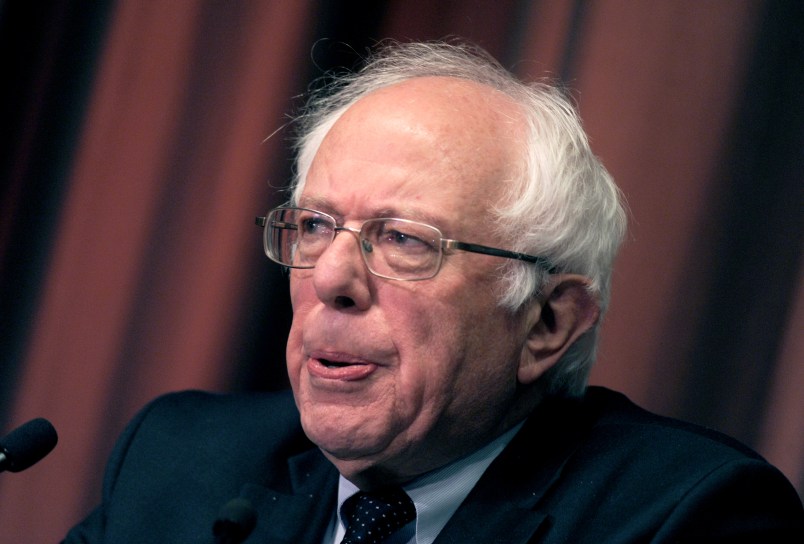WASHINGTON (AP) — Bernie Sanders has a problem.
Remember those superdelegates, the Democratic Party leaders and elected officials who can vote for the candidate of their choice? The ones Sanders’ supporters have been complaining about for months? It turns out, to have a shot at beating out Hillary Clinton for the Democratic nomination for president, he needs them.
A lot of them.
He needs the ones who remain uncommitted, as well as more than 200 of those who have already publicly endorsed Clinton. Mathematically, Sanders cannot win the nomination without that support.
On Saturday, Sanders netted more than two dozen delegates over Clinton in Washington state after the party released vote data broken down by congressional district.
But his math remains dire.
Clinton won the Guam caucus on Saturday and now needs just 17 percent of the delegates at stake in upcoming contests to clinch the nomination. That means she could lose every single contest by a landslide and still be the nominee if all of her superdelegates continue to support her.
___
THE AP DELEGATE COUNT
Clinton: 2,228 delegates.
Sanders: 1,454 delegates.
Needed to win: 2,383 delegates.
The totals include delegates won in primaries and caucuses, as well as public endorsements from superdelegates.
As it stands, Clinton is 155 delegates away from clinching the nomination.
___
PLEDGED DELEGATES
These are the delegates won in primaries and caucuses. They are required to vote for the candidate who won them.
Early in the campaign, Sanders said his plan was to win a majority of pledged delegates, which would persuade the superdelegates to support him as well.
That’s no longer feasible.
Clinton has 1,705 pledged delegates. Sanders has 1,415. Clinton’s 290-delegate lead in pledged delegates is far bigger than any lead Barack Obama had over Clinton during the 2008 primaries.
Sanders would need to win 66 percent of the remaining pledged delegates to close the gap. So far, he’s won just 45 percent of them.
___
SUPERDELEGATES
There are 714 superdelegates, mainly members of Congress and members of the Democratic National Committee. At the party’s national convention, they can vote for the candidate of their choice.
So far, 523 have publicly endorsed Clinton and 39 have endorsed Sanders. That leaves 152 still uncommitted.
That means he would need all of the uncommitted superdelegates. Plus, he would need to persuade more than 200 of Clinton’s superdelegates to switch their allegiance to him.
___
THE PATH TO 2,383
Just 155 delegates short, Clinton is on a glide path to the number needed to win on June 7 when polls close in New Jersey at 8 p.m. EDT, even if she narrowly loses all the contests between now and then.
If she can instead pull out solid victories this month in West Virginia, Kentucky and Oregon — and get some additional endorsements from superdelegates — Clinton could end up celebrating as a presumptive nominee in a place in need of some financial attention: Puerto Rico on June 5.
At least one of its superdelegates, Luisette Colon, earlier this year changed her support from Clinton to uncommitted, citing her desire to learn more about the candidates’ positions on aiding the U.S. territory.
Clinton has recently sent advisers to Puerto Rico to learn more about the Zika virus and called on Congress to assist with the island’s financial crisis. Sanders has also urged help for the island.
Sanders’ steep path to 2,383 can only really end at the party’s convention in Philadelphia, where he intends to give superdelegates all his attention and make the case he is the better general election candidate.
To win, Sanders will need to dominate the final few primaries and then sway more than 300 superdelegates to his side.
So far, he’s only convinced 39.
___
Follow Stephen Ohlemacher and Hope Yen on Twitter at http://twitter.com/stephenatap and https://twitter.com/hopeyen1
Copyright 2016 The Associated Press. All rights reserved. This material may not be published, broadcast, rewritten or redistributed.







Stop it. Bernie doesn’t have a chance, period.
Logic should have stated this to the Sanders campaign long before now.
Like at the outset?
Respect for the process might have given Sen Sanders the environment where this might have been possible.
The decision-making of this campaign staff has been short-sighted for many months.
jw1
“Now is the time for all good men to come to the aid of the party.” – Patrick Henry
Your move, Bernie.
Winning over the super delegates isn’t going to happen. Bernie run is done. The DNC would be wise to embrace his delegates and teach them how inclusive the Party can be and how they can lead the Democratic fight down ballot.
Well, he’s done a great job so far. “Hey you corrupt Wall Street puppets, can’t you see the polls say I beat Trump by even more than Hillary does. Who cares about the will of the voters, I know what The People want. And please ignore the threats of violence from some of my more unhinged supporters.”